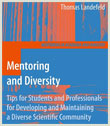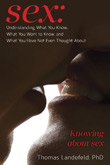As seen from www.amazing-kids.org
By Amina Ramadan
Thomas Landefeld, P.h.D is a distinguished scientist and professor of biology at the University of California Dominguez Hills. In between teaching, lecturing, and being an Amazing Kids! mentor, we are delighted that he could find time for an interview with Amazing Kids! to talk about his life and work in this amazing field!
AK: What do you do as a scientist? What exactly is your field?
TL: My career has had two main facets as a scientist, first as a professor and researcher. As a reproductive endocrinologist, which is a scientist that studies the hormones involved with reproduction, my area of research was the control of a woman’s reproductive cycle. As such, I worked with animals as a model system and used the findings for information about humans. When I was doing this, I was at a medical school, so I also taught students who were studying to become doctors. The second phase of my career as a scientist was in administration where I helped to design and implement programs for students who wanted to be scientists. For example, I administered federal projects that exposed students to scientific research as college students preparing them for professional and graduate degrees.
AK: What do you like best about your career? What do you not like so much?
TL: The best part about what I do is helping students to achieve their educational goals, regardless of whether it is training them directly in my laboratory or overseeing their progress in other laboratory settings. Along the way, I also provide assistance in their courses and studies since doing well in classes is critical to their successes. The only thing that I do not like is that I cannot help more students due to there only being 24 hours in a day!
AK: Why did you choose to pursue a job as a scientist?
TL: I was always intrigued by not having the answers to questions and science provided an avenue to do that, i.e. experimentation.
AK: We understand that you have founded programs to help kids attain their dreams of careers in science. Can you tell us some more about these programs?
TL: I have worked very much with groups that have been poorly represented in science for a number of reasons. This includes females and individuals from different ethnic groups such as Black, Hispanic and Native American. The federal government developed funding programs designed to include individuals from these groups as a way to address this under representation. These programs not only expose the students to research and other activities that will help them continue their education after college but also provides funding to support them along the way. As a researcher and administrator, I was able to obtain these programs at my institution and therefore help our students.
AK: What motivated you to start these programs?
TL: I have always been interested and involved in efforts to include everyone, regardless of their background, in educational programs as education is truly the key to success.
AK: We hear you are a mentor through Amazing Kids! What does your mentoring comprise?
TL: Mentoring is a crucial component of education. ALL of us need mentors and in fact ALL of us can be mentors. Moreover, mentors are like tattoos, once you have them you have them forever. Mentoring is very time and labor intensive BUT it is so gratifying and actually so easy. One just has to care about someone and do what you can to help them get where they want to go to be a mentor.
AK: What influence did your childhood have on your choice of career and other occupations today?
TL: Interestingly, I was always very interested in athletics and actually saw science as a component of that, e.g. health, movement, injuries, etc.. In fact, I had planned to be a science teacher/coach, up until my senior year in college and at that time decided that the study of hormones was the specific area that interested me the most. I applied to a PhD program and here I am. The key is to always do the best you can in your classes AND to always work towards your goal of what you want to do.
AK: Any advice to aspiring scientists out there? To kids considering an occupation in science?
TL: Try science regardless of what your interests are. You may never know if you like it or not if you never really give it a shot. Too often young people are turned off to science because of: 1) the negative stereotype of scientists as portrayed by TV and movies as a geek or nerd. That is NOT the typical scientist. 2) The idea that math and science is too hard. It requires a different type of studying but it is not that it is necessarily harder. Give it a shot. There is nothing better than being the first person to discover something for the first time, and there are still so many things left to be discovered, especially in medicine, health and disease.

